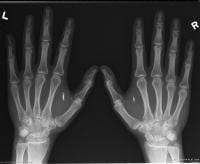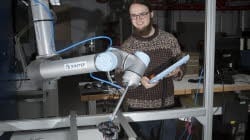
It’s likely the world in the not-so-distant future will be increasingly populated by computerized people like Amal Graafstra.
The 37-year-old doesn’t need a key or password to get into his car, home or computer. He’s programmed them to unlock at the mere wave of his hands, which are implanted with radio frequency identification tags. The rice-size gadgets work so well, the Seattle resident says, he’s sold similar ones to more than 500 customers through his company Dangerous Things.
The move in the Bay Area and beyond to outfit people with electronic devices that can be swallowed, implanted in their bodies or attached to their skin via “smart tattoos” could revolutionize health care and change the way people interact with devices and one another. Critics call the trend intrusive, even sacrilegious. But others say it ultimately will make life better for everybody. Some researchers and executives envision a day when devices placed in people will enable them to control computers, prosthetic devices and many other things solely with their thoughts.
“In the next 10 to 20 years we will see rapid development in bioengineered and man-machine interfaces,” predicted Graafstra, who wrote a book about the technology, adding that the trend is going to “push the boundaries of what it means to be human.”
Bay Area companies and researchers are keenly interested in the topic.
In a patent application made public in November, Google’s (GOOG) Motorola Mobility branch proposed an “electronic skin tattoo” for the throat — with a built-in microphone, battery and wireless transceiver — that would let someone operate other devices via voice commands.
When asked, Google said it often seeks patents on employee brainstorms and that, while “some of those ideas later mature into real products or services, some don’t.” But Google CEO Larry Page apparently is intrigued with enhancing people electronically. A 2011 book about the Mountain View search giant quoted him saying, “Eventually you’ll have an implant, where if you think about a fact, it will just tell you the answer.”
Similar notions are under study by others, including UC Berkeley researchers. In a scholarly paper published in July, they proposed implanting people’s brains with thousands of tiny sensors they called “neural dust.”
The idea initially is to have the little circuits gather detailed data on brain functions. But eventually, lead researcher Dongjin Seo said, the electronic swarms may prove useful for “controlling devices via thought” or stimulating malfunctioning brain regions to restore “limb motor control for paralyzed patients.”
Among the most widely anticipated uses for implants, smart pills and electronic tattoos are medical.
In October, Stanford doctors implanted the brain of a Parkinson’s disease sufferer with a new device that gathers detailed data on the “neural signatures” of his illness. They hope to use the information to make a gadget that will ease Parkinson’s symptoms with electrical impulses that adjust to any activity the patients do.
Last year, Proteus Digital Health of Redwood City won approval to sell a pill that relays information about a person’s vital signs via a mobile phone to their doctor. And officials at Santa Clara-based Intel (INTC) envision their microchips one day in devices ingested or implanted for medical and other uses.
Some fear implants might become mandatory for health insurance or jobs.
The Latest on: Computerizing people
[google_news title=”” keyword=”Computerizing people” num_posts=”10″ blurb_length=”0″ show_thumb=”left”]
via Google News
The Latest on: Computerizing people
- Feed has no items.
via Bing News









